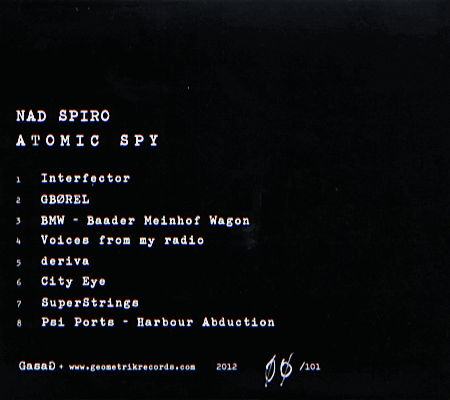
Atomic Spies vs. Dancing Men
july 20, 2013.
One can hardly see where
one bar ends and the next begins.
It's hardly music at all.
( * )
Postal fail.
Epic.
Almost a year ago, Spanish artist Rosa Arruti, who is recording and performing under the moniker Nad Spiro, sent me a copy of her album, Atomic Spy, released on the Spanish Geometrik Records label.
At the time it was brand new.
But I only found it in my mailbox.
Yesterday.
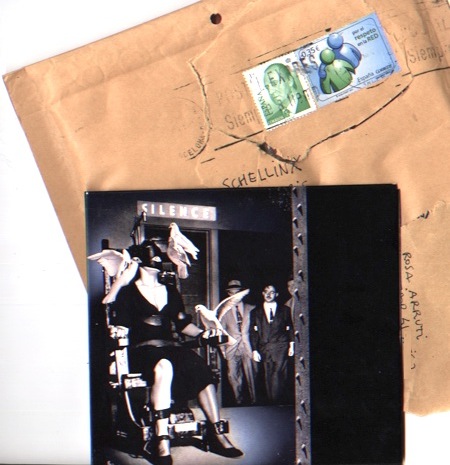
Now that is a long time for a small package to travel from Barcelona to Paris...
What took it so long?
The Barcelona post stamp is not very clear, but is dated either the 20th or 26th of August, 2012. Maybe the envelop fell and slipped underneath or behind some cupboard, at some stage of its travel between post office there and post office here.
And it re-appeared. Because cupboards are moved every now and then, and do not stay in one and the same spot forever.
So someone found it, picked it up and put it back into the postal stream.
Or did the Atomic Spy make it to my apartment building's hall already a year ago? Where the postman accidentally put it in the wrong mailbox? That happens. Regularly. It is easy to imagine how one of my neighbors brought the envelop upstairs, mixed in with his own mail. And then continued to forget to bring the package back downstairs again for many days, weeks, months in a stretch. She put it in the right mailbox only yesterday. Those things happen. I know from experience.
Still. It is far more likely, of course, that the real reason for the delayed delivery is that the package got intercepted by someone keen on decoding the many cyphers it contains.
Maybe she succeeded.
Maybe he did not.
'These tali bans know all the crooked routes'
" Het leven is niets als soldaten sterven elke dag. Wij zijn in een zeer gevaarlijke zone waar we moeten te allen tijde op waarschuwing zijn. Als het reclameverbod tali weten alle routes in de kromme en altijd storm ons kamp nemen ons niet op de hoogte. Het ergste is de zelfmoordcommando's die in verschillende vermomming, dus soms die ik heb geen tijd komen voor een bezoek aan het internetcafé. Een heleboel soldaten is heengegaan vertrouwen mij.
Nu, luister ik blok middelen ontdekt tijdens onze recente inval in zuidelijke Kabul. Ik geteld in bundels en nam haar 28,5 miljoen dollar. Ik heb gevraagd de UN Agent over te dragen hen aan u als uw leger Items u verlaten in Afghanistan voordat u voor een andere missie worden verzonden.
Storting code: QW-KMT-5543080442; deposant: Carsten Jacobson; release gebruikersnaam: HELIKOPTER; wachtwoord: KABUL01.
Merk op dat de Agent geen idee van de echte inhoud maar als objecten met een leger heeft. "
Met vriendelijke groet,
BRI. Gen. Carsten Jacobson. " ( * )
Cryptomania
Atomic Spy, in Rosa Arruti's own words, "evokes secret accidents, car-park conspiracies, body invasions, melodies from a lost city, and ghost transmissions" (including spy number station messages in the CD's 2nd track, GBØREL, effective and suggestive as always). The atmospheric and dark electronic 'sound fictions' make a great fit for the night, a couple of weeks ago, when I found myself in the back of a four-wheel drive, being bumped around a swampy forest in Burgundy, not far from where some 2000 years ago Roman warlord Julius Ceasar beat Vercingetorix, leader of a confederation of Gallic tribes, in the Battle of Alesia.
Goal of that curious nightly exercise was the acquisition of a certain volume of a certain material. Let's say the material in question was nuclear. That should catch the NSA's attention, what do you think? It will also explain why all of this took place in the dead of night, the four-wheel drives, the guns, the masks, the balaclava's, the funny accents... And though Rosa's CD was not a priori related at all to our nightly mission, the commando's actions do provide a fine a posteriori justification for the delayed-arrival-record's title.
 | 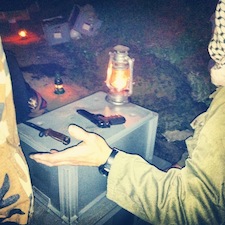 |
Making a deal and acquiring the material came first.
Delivering the goods came next.
I had been asked to encrypt the coordinates of the place of delivery, which I then did in seven different ways. Here is one of the seven encodings:
67 32 47 17 57 49
Especially short codes can be found to 'mean' many, many different things. In general it will be easy to think of a lot of potential decodings. And all will seem to make sense. But only one of the many meanings will be both sensible and correct, in the sense that it corresponds to the encoded 'meaning'. Imagine, as a trivial example, that you want to encode the pincode of your credit card (7432) and decide to do this as follows: you add 1234 to the code - 8666 - and then, in a cycle of the digits, you go 1 place to the right: 6668. There is nothing at all in the result of this encoding - 6668 - that even but hints at the fact that its intended meaning is '7432' rather than '5438' or whatever other 4 digit number; any 4 digit number is equally likely to be your pincode; though only one of the 104 possible foursomes is correct.
In order to succeed in correctly decoding short codes of which you do not have the key, you will need a lot of luck. Or quite a bit of meta knowledge. What is it, that has been encoded? If it is a text, then which language is it in? If the message is a series of numbers, then what do the numbers designate? Is there maybe some part of the intended message that I already know, or can guess? (As an example: most cell phone numbers in the Netherlands and France start with '06'.) Sherlock Holmes, in The Adventure of the Dancing Men, deciphers the encoded messages by - correctly - guessing that the messages are in English, that a dancing man with a little flag denotes the end of a word, that a certain sequence encodes Elsie, etc., thus following a very basic method of cryptography.)
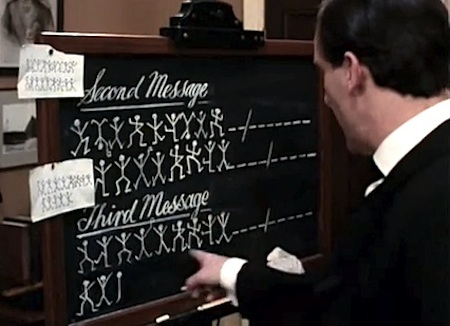
Also deep in the dark Burgundy forest there was quite a bit of evident 'meta knowledge' available to the aspiring decoders. They knew that what was encoded were GPS coordinates: a longitude and a latitude. And they knew that these were the coordinates of a place that had to be reached within a very limited span of time. So it could not be very far from the spot where the commando's were at the time they had to decode the cyphers. It therefore was more than reasonable to assume that the 'degrees' and 'minutes' North and East were already known (or easy to find...)
Together this rather substantial circumstantial information would have been sufficient for an educated guess that '67 32 47 17 57 49' is a Vigenére-like encoding, using a 'pincode'-keyword. The information was also sufficient to actually find that pincode, and hence the sought coordinates.
But in the middle of the night, in the cold and in the dark, stressed, fatigued and without any previous training in cryptography, staring at these numbers, say, was it time lost?
...
Suis,
me bonne,
me de ?
Suis bonne,
je parfois,
je bonne !
...
Among the many possible fun ways (riddles, drawings, engravings, absurdist poems) in which one may encode messages, music may not be the surest. But it surely is a most entertaining way.
"It's hardly music at all," Miss Marple sighs in The Secret of Chimneys ( * ). The sleuthing spinster stands in front of a grand piano, where she hits a couple of keys and contemplates the notes scrambled on the piece of music paper that was lifted from the breast pocket of Ludwig von Stainach, an Austrian Count found murdered in a secret corridor beneath a British manor. "Is it possible, that it is in fact a message of some sort? In code?" ...
Well of course it is code, you silly old tart! You're starring in a detective movie, aren't you? ... Though it leaves Jane flabbergasted, deciphering the message poses no problem at all to Lady Eileen 'Bundle' Brent. "Oh, it's child's play!" Bundle exclaimed. "One simply transposes the music from notes into letters. So ... two octaves ... take us from A up to O ... while these eleven sharps ... bring us all the way up to Z..."
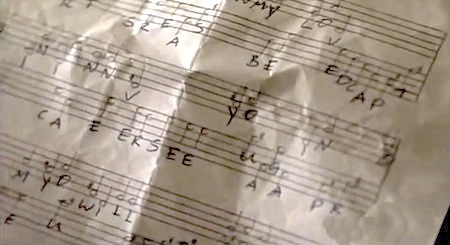
Child's play indeed. Musical encoding only gets really interesting when there's is no paper score to start with. When there's only a tune to hear for the spy, the crook, the detective or victim... And of course there is little reason for such a code to be 'hardly music at all'.
That'll depend.
For starters, on the coder.
Then last but not least, on the ears of the one who decodes.
"Not one stone upon another soul..."
" [...] Quand les troupes françaises en marche aperçoivent les tourbillons de fumée, il est déjà trop tard. Leclerc décide quand même de canonner la ville et s'empare des forts qui l'entourent ; mais, quand il pénètre dans les faubourgs, il ne reste plus pierre sur pierre ni âme qui vive dans ce qui a été la plus belle et la plus riche ville des îles des Caraïbes. Les derniers Nègres se sont repliés sur le Haut-du-Cap et dans les collines qui dominent la baie. Leclerc ordonne une expédition dans les marais avoisinants pour repousser le plus loin possible les soldats de Christophe ; puis, tant bien que mal, il prend position aux portes de Cap-Français. En face, les Nègres dirigés par Christophe s'enfoncent dans l'intérieur du pays, ivres de haine, et, comme l'avait ordonné Louverture, ils empoisonnent les sources, saccagent les plantations, détruisent les réserves de nourriture, massacrant les colons et mettant sur leur passage le pays à feu et à sang. La campagne de Cap-Français laisse l'armée de Leclerc hébétée : elle pensait vaincre sans combattre et s'installer dans les douceurs de la vie créole. Pour l'heure, les soldats sont épuisés, déçus, écrasés de chaleur et sans nourriture fraiche. " ( *** )
Here's is what my musical encoding of the secret spot in the Burgundy forest sounded like. It's a fifty second piece for strings and flute. We of course all would have preferred a virtuoso rendering by flesh-and-blood musicians. But for now you will have to do with the MIDI version. So...
Listen.
And listen again.
Hum it, and hum it again.
Then break it...
Atomic Spy
Thank you, Rosa, for sending me the CD. I'm glad that, eventually, it did arrive.
I have listened to it a couple of times now.
The fourth track, Voices from my radio, is my favorite.
It is like a conversation, in code. Correction: it is a conversation, in code. The track has a nice, relaxed pace and includes some of our beloved dictaphone signature sounds (more about these in the upcoming 'tales for tapes' article).
There's also the voice of Madonna.
...
notes __ ::
(*) ITV movie 'The Secret of Chimneys' (2010), loosely based on an Agatha Christie novel of the same name. [
^ ]
(**) From an email (bi-lingual) received on Friday July 19th, from Bri. Gen. Castern Jacobson [gen_jecobson@yahoo.co.jp]. This is the message's English version:
" I REPEAT IN ENGLISH.
Brigadier General Carsten Jacobson.
Spokesperson,International Security Assistance Force (ISAF)
Commander 1st Panzer Division (Bundeswehr)
CURRENTLY SERVING IN AFGHANISTAN./PAKISTAN.
How are you today?
Life is nothing here as soldiers die every day. We are in a very dangerous zone where we have to be at alert at all times. These tali bans know all the crooked routes and always storm our camp taking us unaware.The worst is the suicide bombers who come in different disguise, so sometimes I have no time to visit the internet cafe. A lot of soldiers has passed away trust me.
Now, listen I discovered block funds during our recent raid in southern Kabul. I counted it in bundles and assumed its 28.5 million dollars. I have asked the UN Agent to hand them over to you as your Army Items you left in Afghanistan before you are sent for another Mission.
Pleas the deposit information are stated below:
For security purposes I did not mention your name but I gave a code and password which you must mention to the UN Missionary Envoy on his arrival to permit him release of the boxes to you.
DEPOSIT CODE: QW-KMT-5543080442
DEPOSITOR: Carsten Jacobson.
RELEASE USERNAME: HELICOPTER.
PASSWORD: KABUL01.
Please keep very confidential as anybody who can provide these deposit information to the Agent will automatically claim the funds.
Note that the Agent has no idea of the real content but as Army Items.
Regards,
Bri. Gen. Carsten Jacobson. " [
^ ]
(***) From Histoire d'Haïti. La première république noire du Nouveau Monde by Catherine Eve Roupert. Page 148, part of a reading during one of the performances at the First Floor Placard, La Générale, Sèvres, on July 20th, 2013. [
^ ]
tags: Nad Spiro, cryptography, numbers, Sherlock Holmes, Agatha Christie, Miss Marple, Haïti
# .442.
comments for "Atomic Spies vs. Dancing Men" ::
|
Comments are disabled |
